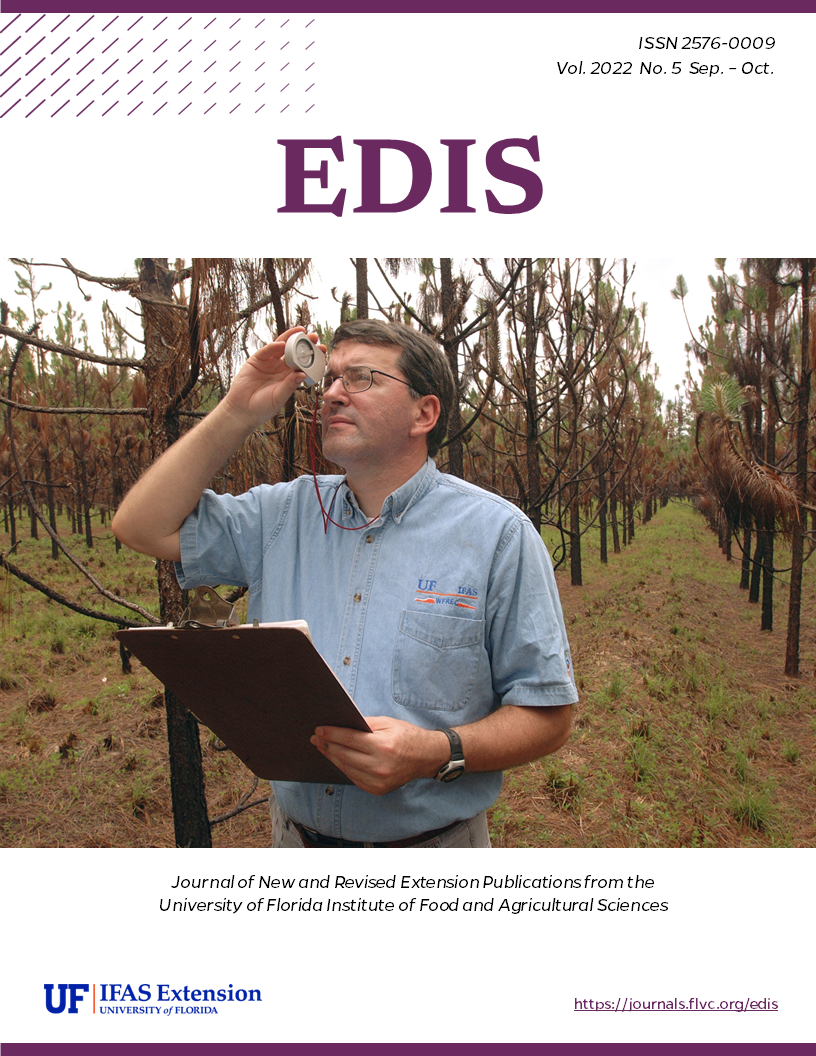Abstract
As coastal managers and practitioners continue placing artificial reefs in marine waters, the scientific understanding of the effects and implications of artificial reefs is changing. It is especially important for resource managers and Extension and outreach personnel, as well as the interested public, to keep aware of these changes as they occur, but usually scientific studies are first published in peer-reviewed journals that may be inaccessible. This publication describes some of the most recent artificial reef studies that are likely to be especially relevant to Florida. Each is summarized and its potential relevance to Florida described. This is not a complete record of recent research, but it should help the interested public, managers, educators, and outreach personnel stay informed of recent developments in artificial reef science that should be considered when making decisions about artificial reefs.
References
Ajemian, M. J., J. M. Drymon, N. Hammerschlag, R. J. D. Wells, G. Street, B. Falterman, J. A. McKinney,W. B. Driggers, E. R. Hoffmayer, C. Fischer, and G. W. Stunz. 2020. “Movement Patterns and Habitat Use of Tiger Sharks (Galeocerdo cuvier) across Ontogeny in the Gulf of Mexico.” PloS one 15 (7): e0234868. https://doi.org/10.1371/journal.pone.0234868
Ajemian, M. J., J. J. Wetz, B. Shipley-Lozano, and G. W. Stunz. 2015. “Rapid Assessment of Fish Communities on Submerged Oil and Gas Platform Reefs Using Remotely Operated Vehicles.” Fisheries Research 167:143–155. https://doi.org/10.1016/j.fishres.2015.02.011
Arena, P. T., L. K. Jordan, and R. E. Spieler. 2007. “Fish Assemblages on Sunken Vessels and Natural Reefs in Southeast Florida, USA.” In Biodiversity in Enclosed Seas and Artificial Marine Habitats 157–171. Springer, Dordrecht. https://doi.org/10.1007/978-1-4020-6156-1_14
Becker, A., M. D. Taylor, H. Folpp, and M. B. Lowry. 2018. “Managing the Development of Artificial Reef Systems: The Need for Quantitative Goals.” Fish and Fisheries 19:740–752. https://doi.org/10.1111/faf.12288
Becker, A., M. D. Taylor, J. McLeod, and M. B. Lowry . 2020. “Application of a Long-Range Camera to Monitor Fishing Effort on an Offshore Artificial Reef.” Fisheries Research 228 105589. https://doi.org/10.1016/j.fishres.2020.105589
Bell, M., C. J. Moore, and S. W. Murphey. 1989. “Utilization of Manufactured Reef Structures in South Carolina's Marine Artificial Reef Program.” Bulletin of Marine Science 44 (2): 818–830.
Camp, E. V., L. Chong, A. B. Collins, H. Abeels, K. Mille, M. Sipos, B. Hall-Scharf, A. Zangroniz, L. S. Jackson, S. Krueger, and V. Blanco. 2022. “An Update on Florida’s Artificial Reefs: Recent Deployments and Trends.” https://doi.org/10.32473/edis-fa242-2022
Florisson, J. H., J. R. Tweedley, T. H. Walker, and J. A. Chaplin. 2018. “Reef Vision: A Citizen Science Program for Monitoring the Fish Faunas of Artificial Reefs.” Fisheries Research 206: 296–308. https://doi.org/10.1016/j.fishres.2018.05.006
Hylkema, A., A. O. Debrot, R. Osinga, P. S. Bron, D. B. Heesink, A. K. Izioka, C. B. Reid, J. C. Rippen, T. Treibitz, M. Yuval, and A. J. Murk. 2020. “Fish assemblages of three common artificial reef designs during early colonization.” Ecological Engineering 157: 105994. https://doi.org/10.1016/j.ecoleng.2020.105994
Hylkema, A., Q. C. Hakkaart, C. B. Rei, R. Osinga, A. J. Murk and A. O. Debrot. 2021. “Artificial Reefs in the Caribbean: A Need for Comprehensive Monitoring and Integration into Marine Management Plans.” Ocean & Coastal Management 209:105672. https://doi.org/10.1016/j.ocecoaman.2021.105672
Karnauskas, M., J. F. Walter III, M. D. Campbell, A. G. Pollack, J. M. Drymon, and S. Powers. 2017. “Red Snapper Distribution on Natural Habitats and Artificial Structures in the Northern Gulf of Mexico.” Marine and Coastal Fisheries 9:50–67. https://doi.org/10.1080/19425120.2016.1255684
Lemoine, H. R., A. B. Paxton, S. C. Anisfeld, R. C. Rosemond, and C. H. Peterson. 2019. “Selecting the Optimal Artificial Reefs to Achieve Fish Habitat Enhancement Goals.” Biological Conservation 238:108200. https://doi.org/10.1016/j.biocon.2019.108200
Lima, J. S., I. R. Zalmon, and M. Love. 2019. “Overview and Trends of Ecological and Socioeconomic Research on Artificial Reefs.” Marine environmental research 145:81–96. https://doi.org/10.1016/j.marenvres.2019.01.010
Lindberg, W. J., and W. Seaman (editors). 2011. Guidelines and Management Practices for
Artificial Reef Siting, Use, Construction, and Anchoring in Southeast Florida. Florida Department of Environmental Protection. Miami, FL. xi and 150 pages.
Paxton, A. B., K. W. Shertzer, N. M. Bacheler, G. T. Kellison, K. L. Riley, and J. C. Taylor. 2020a. “Meta-Analysis Reveals Artificial Reefs Can Be Effective Tools for Fish Community Enhancement but Are not One-Size-Fits-All.” Frontiers in Marine Science 7:282. https://doi.org/10.3389/fmars.2020.00282
Paxton, A. B., E. A. Newton, A. M. Adler, R. V. Van Hoeck, E. S. Iversen Jr, J. C. Taylor, C. H. Peterson, and B. R. Silliman. 2020b. “Artificial Habitats Host Elevated Densities of Large Reef-Associated Predators.” PloS one 15: e0237374. https://doi.org/10.1371/journal.pone.0237374
Rouse, S., J. S. Porter, and T. A. Wilding. 2020. “Artificial Reef Design Affects Benthic Secondary Productivity and Provision of Functional Habitat.” Ecology and evolution 10:2122–2130. https://doi.org/10.1002/ece3.6047
Sheehy, D. J. 1985. “New Approaches in Artificial Reef Design and Applications.” Artificial Reefs: Marine and Freshwater Applications 253–263. https://doi.org/10.1201/9781351069915-9
Simard, P, K. R. Wall, D. A. Mann, C. C. Wall, and C. D. Stallings. 2016. “Quantification of Boat Visitation Rates at Artificial and Natural Reefs in the Eastern Gulf of Mexico Using Acoustic Recorders.” PloS one 11:e0160695. https://doi.org/10.1371/journal.pone.0160695
Schuett, M. A., C. Ding, G. Kyle, and J. D. Shively. 2016. “Examining the Behavior, Management Preferences, and Sociodemographics of Artificial Reef Users in the Gulf of Mexico Offshore from Texas.” North American Journal of Fisheries Management 36:321–328 https://doi.org/10.1080/02755947.2015.1123204
Snodgrass, D. J., E. S. Orbesen, J. F. Walter, J. P. Hoolihan, and C. A. Brown. 2020. “Potential Impacts of Oil Production Platforms and Their Function as Fish Aggregating Devices on the Biology of Highly Migratory Fish Species.” Reviews in Fish Biology and Fisheries 30:405–422. https://doi.org/10.1007/s11160-020-09605-z
Streich, M. K., M. J. Ajemian, J. J. Wetz, and G. W. Stunz. 2017. “A Comparison of Fish Community Structure at Mesophotic Artificial Reefs and Natural Banks in the Western Gulf of Mexico.” Marine and Coastal Fisheries 9:170–189. https://doi.org/10.1080/19425120.2017.1282897

